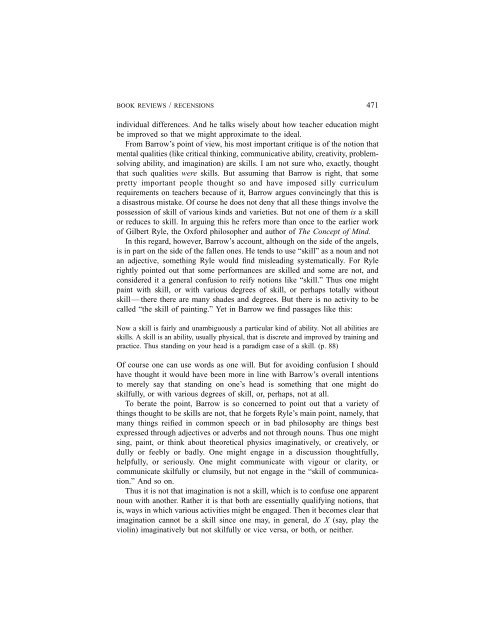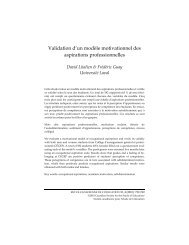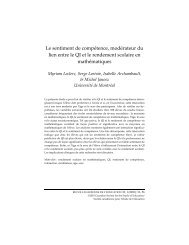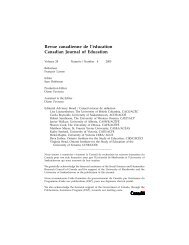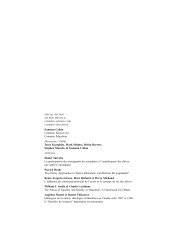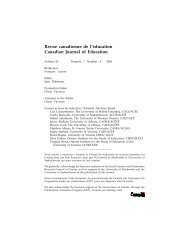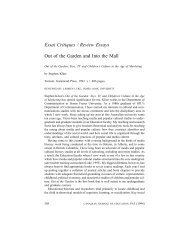Mireille Falardeau et Michel Loranger Le choix de stratégies ... - CSSE
Mireille Falardeau et Michel Loranger Le choix de stratégies ... - CSSE
Mireille Falardeau et Michel Loranger Le choix de stratégies ... - CSSE
You also want an ePaper? Increase the reach of your titles
YUMPU automatically turns print PDFs into web optimized ePapers that Google loves.
BOOK REVIEWS / RECENSIONS 471<br />
individual differences. And he talks wisely about how teacher education might<br />
be improved so that we might approximate to the i<strong>de</strong>al.<br />
From Barrow’s point of view, his most important critique is of the notion that<br />
mental qualities (like critical thinking, communicative ability, creativity, problemsolving<br />
ability, and imagination) are skills. I am not sure who, exactly, thought<br />
that such qualities were skills. But assuming that Barrow is right, that some<br />
pr<strong>et</strong>ty important people thought so and have imposed silly curriculum<br />
requirements on teachers because of it, Barrow argues convincingly that this is<br />
a disastrous mistake. Of course he does not <strong>de</strong>ny that all these things involve the<br />
possession of skill of various kinds and vari<strong>et</strong>ies. But not one of them is a skill<br />
or reduces to skill. In arguing this he refers more than once to the earlier work<br />
of Gilbert Ryle, the Oxford philosopher and author of The Concept of Mind.<br />
In this regard, however, Barrow’s account, although on the si<strong>de</strong> of the angels,<br />
is in part on the si<strong>de</strong> of the fallen ones. He tends to use “skill” as a noun and not<br />
an adjective, som<strong>et</strong>hing Ryle would find misleading systematically. For Ryle<br />
rightly pointed out that some performances are skilled and some are not, and<br />
consi<strong>de</strong>red it a general confusion to reify notions like “skill.” Thus one might<br />
paint with skill, or with various <strong>de</strong>grees of skill, or perhaps totally without<br />
skill — there there are many sha<strong>de</strong>s and <strong>de</strong>grees. But there is no activity to be<br />
called “the skill of painting.” Y<strong>et</strong> in Barrow we find passages like this:<br />
Now a skill is fairly and unambiguously a particular kind of ability. Not all abilities are<br />
skills. A skill is an ability, usually physical, that is discr<strong>et</strong>e and improved by training and<br />
practice. Thus standing on your head is a paradigm case of a skill. (p. 88)<br />
Of course one can use words as one will. But for avoiding confusion I should<br />
have thought it would have been more in line with Barrow’s overall intentions<br />
to merely say that standing on one’s head is som<strong>et</strong>hing that one might do<br />
skilfully, or with various <strong>de</strong>grees of skill, or, perhaps, not at all.<br />
To berate the point, Barrow is so concerned to point out that a vari<strong>et</strong>y of<br />
things thought to be skills are not, that he forg<strong>et</strong>s Ryle’s main point, namely, that<br />
many things reified in common speech or in bad philosophy are things best<br />
expressed through adjectives or adverbs and not through nouns. Thus one might<br />
sing, paint, or think about theor<strong>et</strong>ical physics imaginatively, or creatively, or<br />
dully or feebly or badly. One might engage in a discussion thoughtfully,<br />
helpfully, or seriously. One might communicate with vigour or clarity, or<br />
communicate skilfully or clumsily, but not engage in the “skill of communication.”<br />
And so on.<br />
Thus it is not that imagination is not a skill, which is to confuse one apparent<br />
noun with another. Rather it is that both are essentially qualifying notions, that<br />
is, ways in which various activities might be engaged. Then it becomes clear that<br />
imagination cannot be a skill since one may, in general, do X (say, play the<br />
violin) imaginatively but not skilfully or vice versa, or both, or neither.


